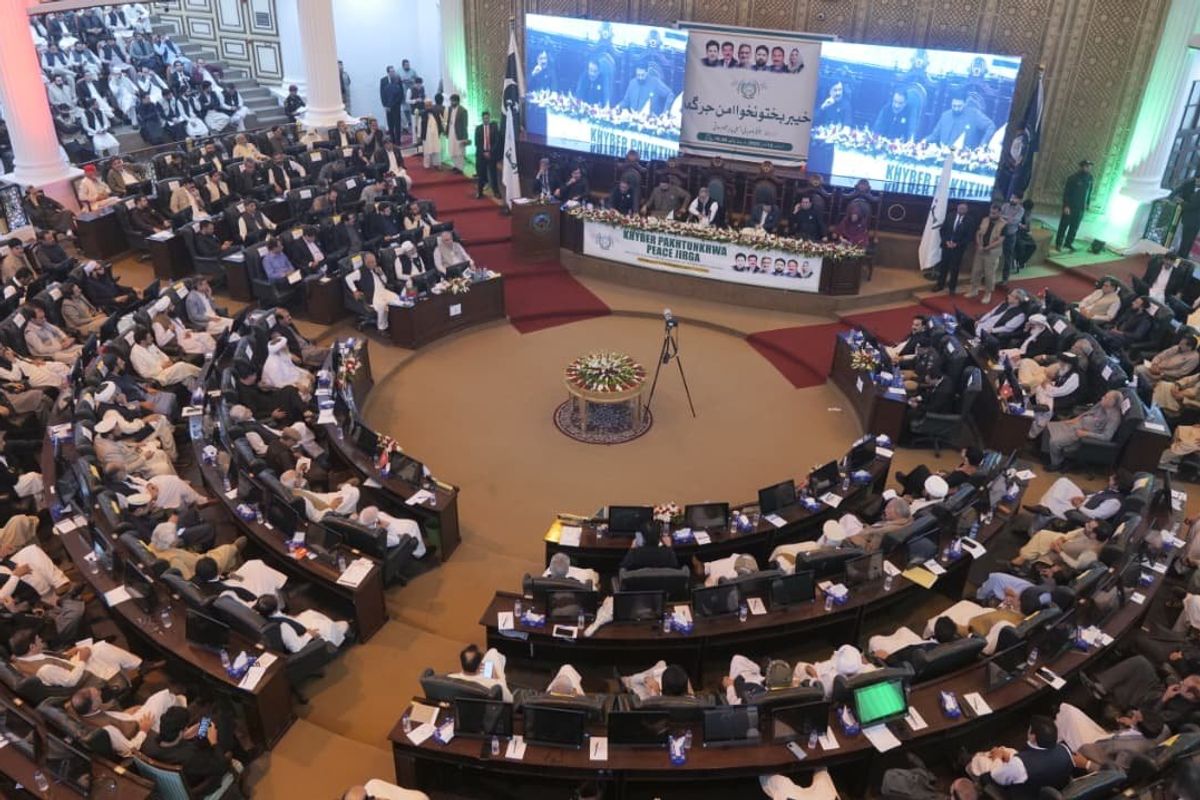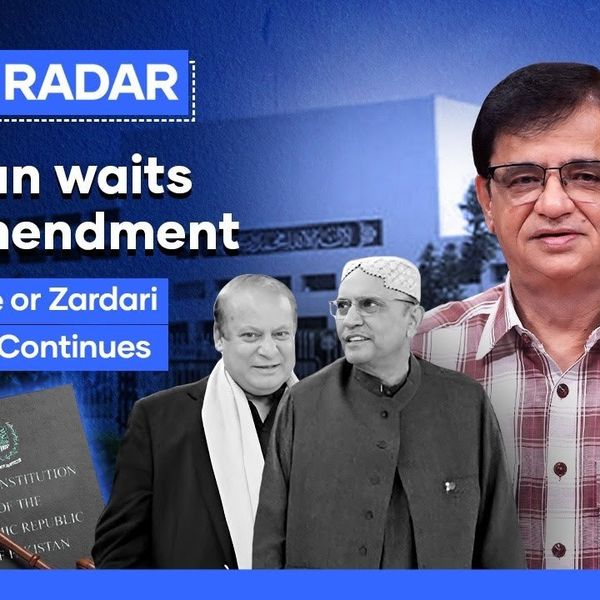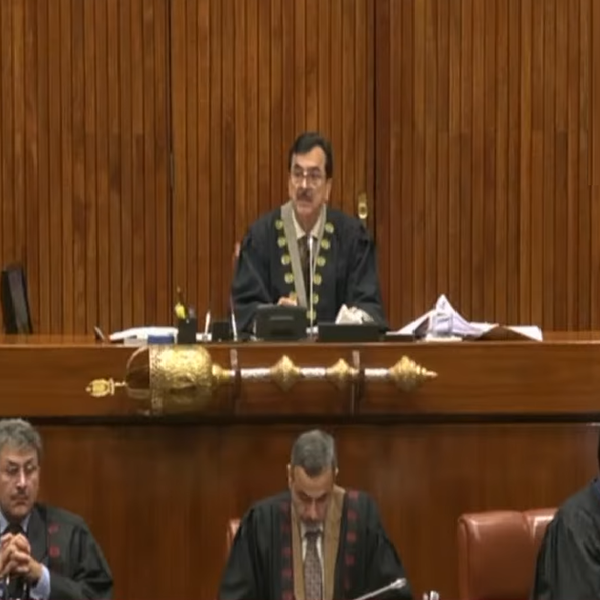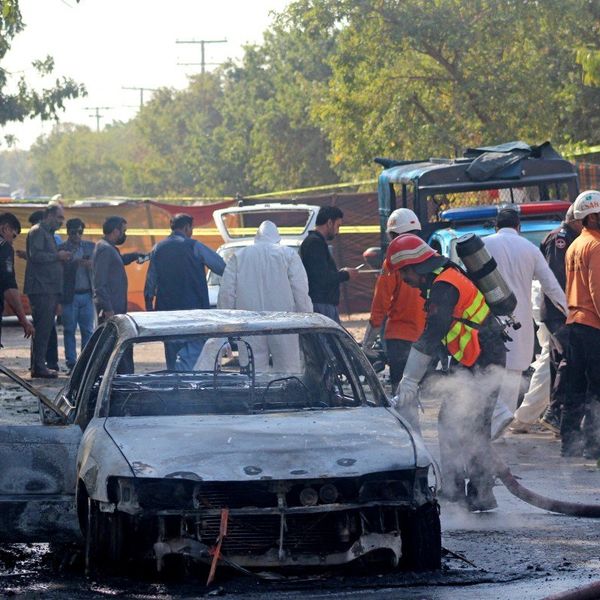Pakistan’s KP Peace Council urges provincial control over security operations
Council’s 15-point declaration calls for provincial control of security, federal support as needed, and full assembly consultation
Kamran Ali
Correspondent Nukta
Kamran Ali, a seasoned journalist from Khyber Pakhtunkhwa, Pakistan, has a decade of experience covering terrorism, human rights, politics, economy, climate change, culture, and sports. With an MS in Media Studies, he has worked across print, radio, TV, and digital media, producing investigative reports and co-hosting shows that highlight critical issues.

A meeting of the KP Peace Council took place on Wednesday.
Nukta
Pakistan’s Khyber Pakhtunkhwa (KP) Peace Council has urged the federal government to delegate internal security responsibilities to the provincial police and Counter-Terrorism Department (CTD), emphasizing that the provincial assembly should be consulted before launching any counterterrorism operations.
The call reflects ongoing concerns about provincial autonomy and effective local security management in a region long affected by militancy and cross-border instability.
The KP government convened an Aman Jirga (Peace Council) at the provincial assembly in Peshawar, a forum that brings together political leaders, administrators, tribal elders, and civil society representatives to discuss and recommend solutions for peace and security in the province.
The meeting was attended by Chief Minister Sohail Afridi, Governor Faisal Karim Kundi, Inspector General of Police Zulfiqar Hameed, Chief Secretary Shahab Ali Shah, provincial lawmakers, political party leaders, lawyers and several former chief ministers and governors.
KP Peace Council urges local control
The council issued a 15-point declaration advocating that primary responsibility for internal security lie with provincial authorities, with federal institutions assisting only when necessary. The declaration also called for full consultation with the provincial assembly before any security operation and stressed the need for both federal and provincial governments to enforce law and authority across Khyber Pakhtunkhwa.
Among the proposals, the council recommended the creation of a provincial action plan on peace and security, in-camera briefings for lawmakers, and implementation of assembly resolutions opposing the Action in Aid of Civil Power Regulation. It also advocated halting mineral extraction until regulatory frameworks are strengthened, reopening historic Pakistan-Afghanistan trade routes, and granting the province a role in shaping Pakistan’s policy toward Afghanistan.
Additional recommendations focused on easing federal-provincial tensions, holding timely meetings of the Council of Common Interests (CCI), safeguarding fiscal rights, and establishing provincial peace forums.
Speaking at the Jirga, Chief Minister Sohail Afridi emphasized the need for long-term strategies rather than short-term solutions. “Political differences are inherent in any democracy, but peace is a shared goal that transcends all divides,” he said.
“Terrorism spares no one, regardless of political affiliation or ideology. We must come together to frame a policy with broad consensus that ensures sustainable peace.”
Leaders call for long-term peace strategy
Governor Faisal Karim Kundi highlighted KP’s vulnerability due to instability in neighboring Afghanistan. “Every time a superpower intervenes in Afghanistan, it leaves behind lethal weaponry that later falls into the hands of militants,” he said. Kundi urged the provincial government to adopt a rational, evidence-based approach when negotiating with federal authorities to protect KP’s interests.
Mian Iftikhar Hussain, Jirga member and provincial president of the Awami National Party (ANP), stressed that while counterterrorism action under the National Action Plan is essential, provincial ownership of security strategy enhances implementation.
Recalling the ANP-led government of 2008, he noted, “We engaged with the federal government and held peace talks with the Taliban, but when those efforts failed, we coordinated with federal authorities to tackle the terrorists.”
Shafi Jan, Advisor to the CM on Information, told Nukta that all proposals would be reviewed and approved in the upcoming cabinet meeting. “Following consultations with the Special Parliamentary Committee on Security and Peace, we will coordinate with state institutions to ensure effective execution,” he added.
The Peace Council’s recommendations come amid heightened attention on provincial autonomy and security governance in regions bordering Afghanistan, where militancy and cross-border tensions continue to challenge Pakistan’s stability.
Analysts suggest that implementing these measures could serve as a model for decentralized security management in other conflict-prone areas globally.










Comments
See what people are discussing